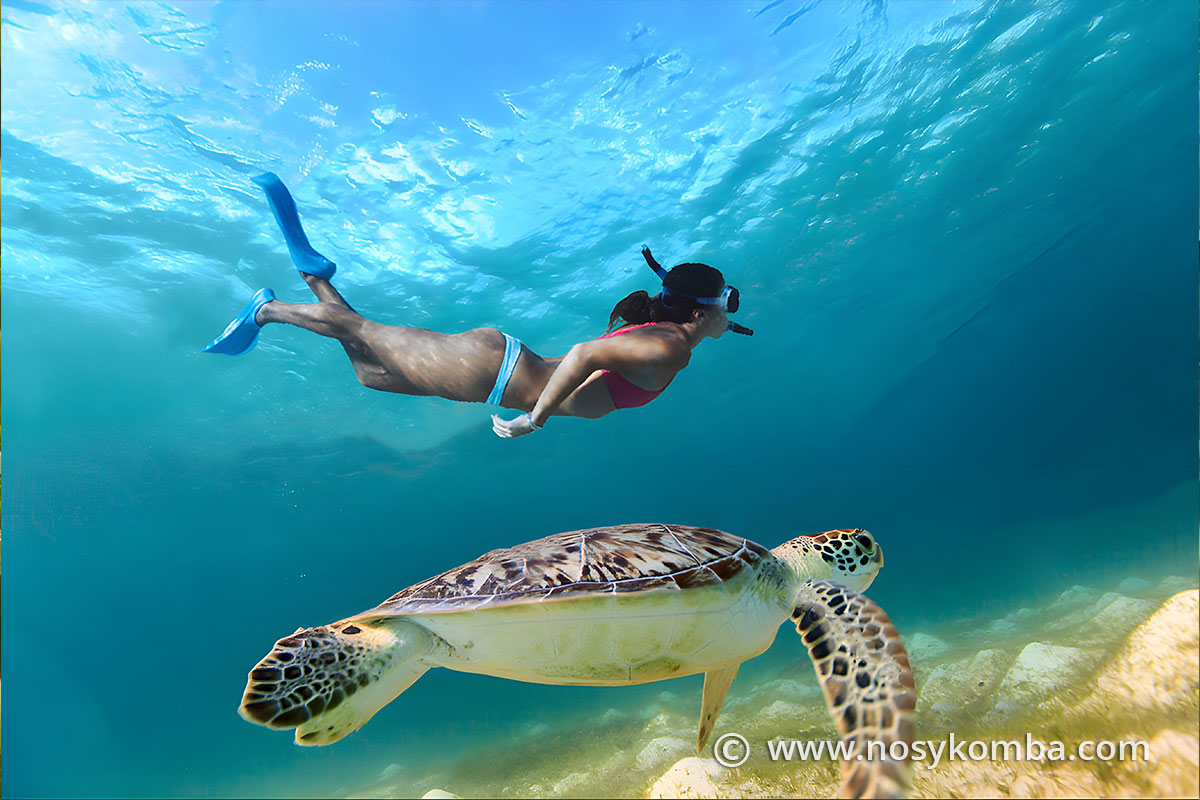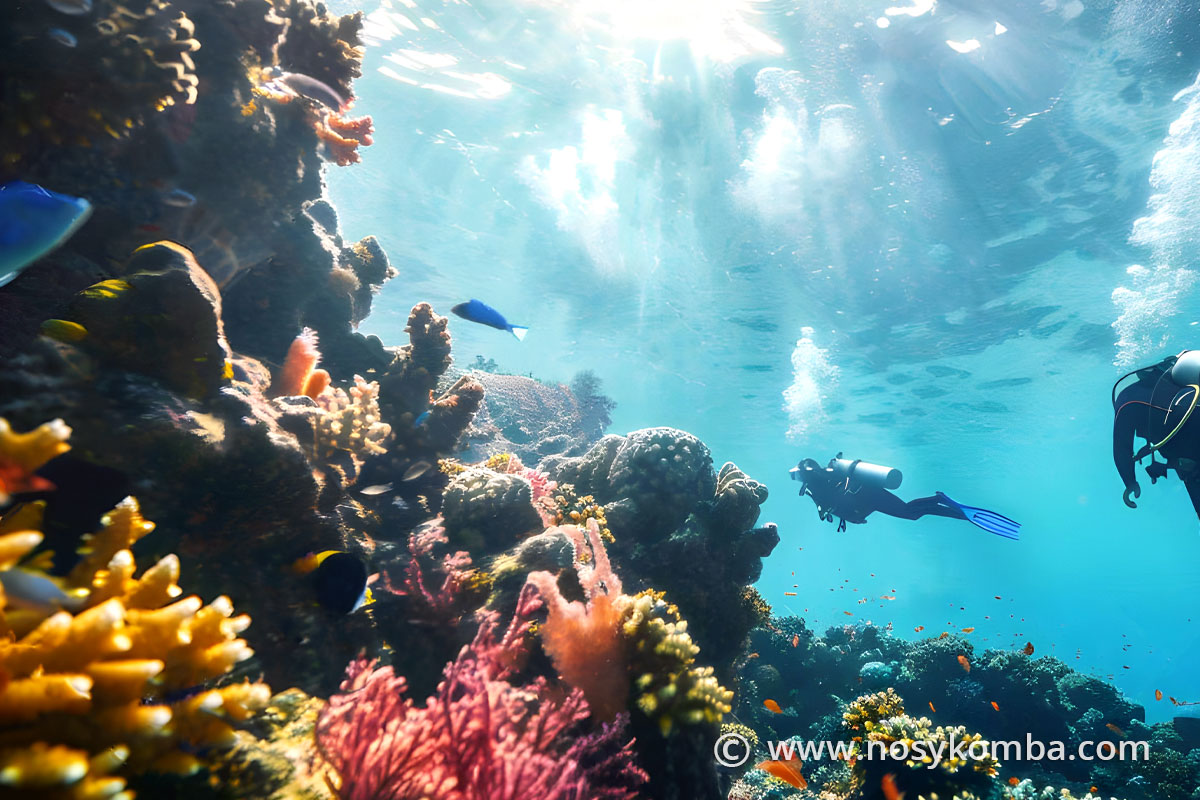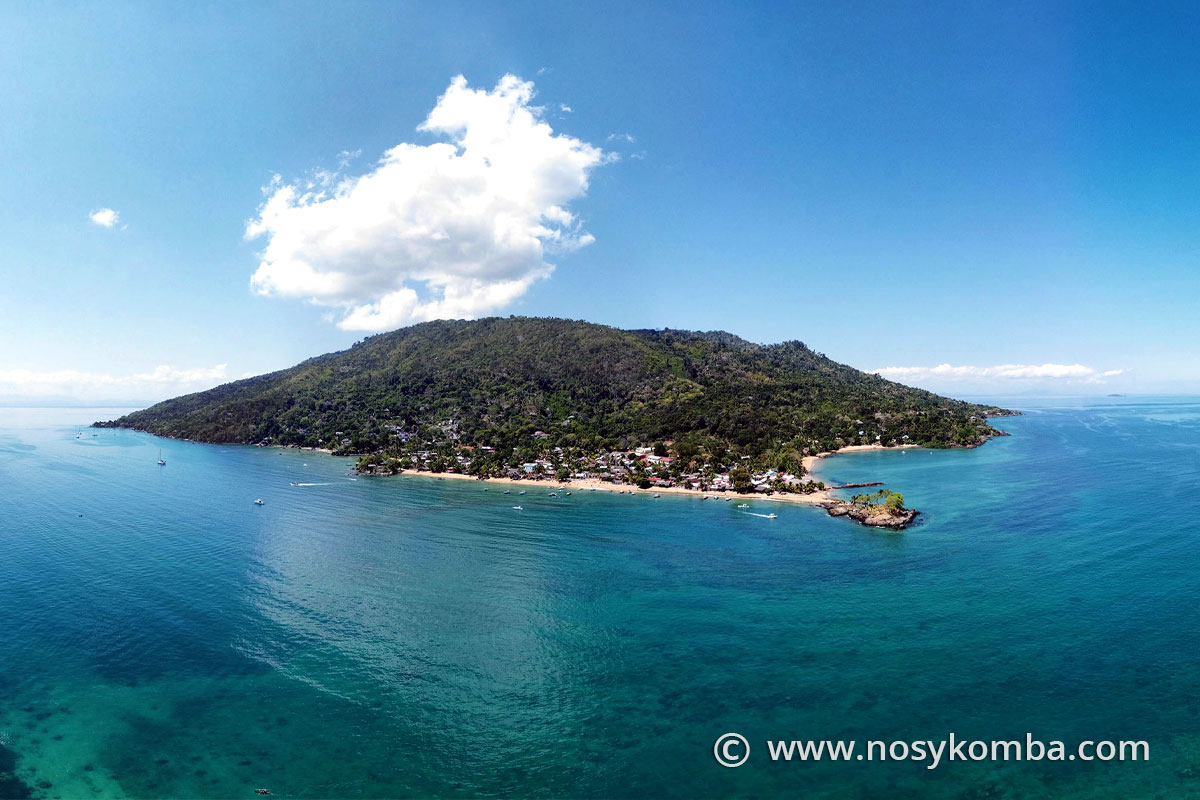Nosy Be and Nosy Komba are great snorkelling destinations, with their varied underwater landscapes. On a snorkelling trip, you’ll discover a world where nature reigns supreme, where every detail, every colour, every fish marks an ecosystem that is still present.
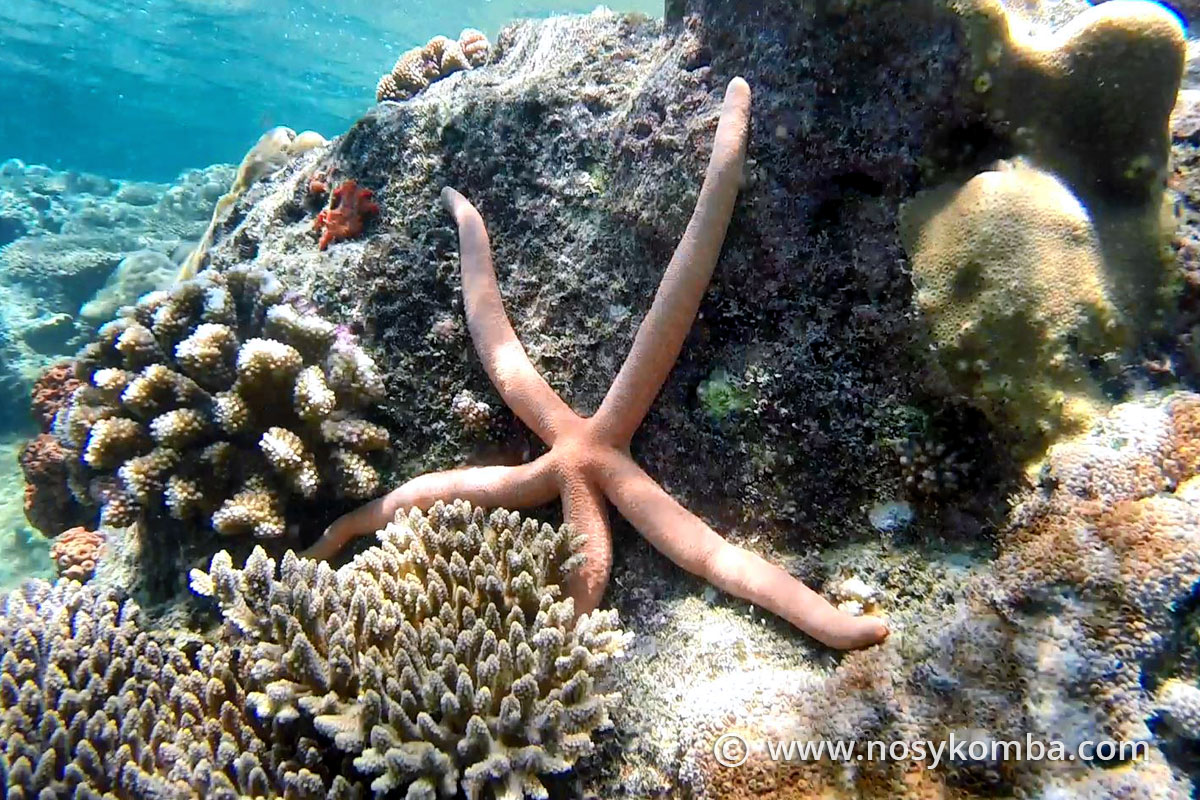
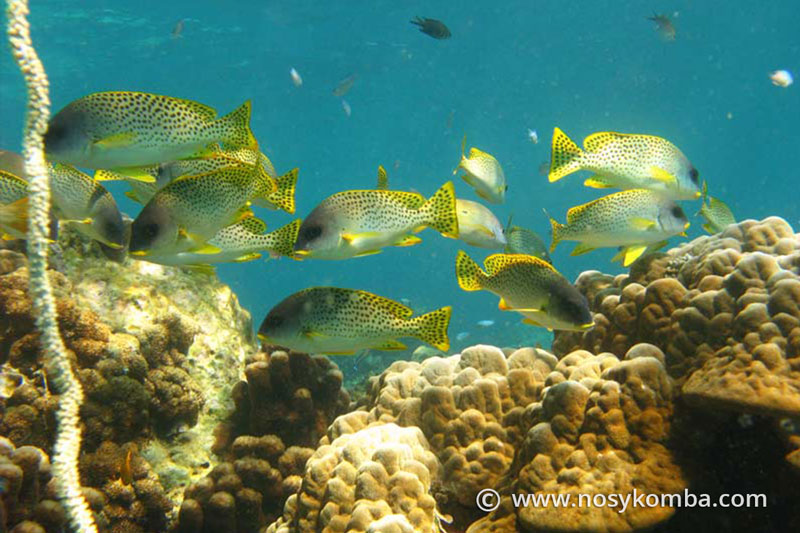
Why snorkel in Nosy Be and Nosy Komba?
Exceptional marine biodiversity
The waters around Nosy Be and Nosy Komba are teeming with life:
- Sea turtles: These majestic creatures swim gracefully close to the reefs.
- Tropical fish: Multicoloured shoals, such as parrotfish and clownfish, add a touch of magic to every outing.
- Live coral: Live coral : The coral reefs are home to an infinite number of species, forming a veritable underwater rainbow.
- Starfish and nudibranchs: These little ocean treasures add a touch of curiosity to your exploration.
The best snorkelling spots in Nosy Be
-
Nosy Tanikely: A protected marine reserve
Nosy Tanikely is often referred to as “the snorkelling spot” in the area.
- What you’ll see: Turtles, schools of colourful fish and spectacular coral.
- Special feature: The shallow waters offer excellent visibility, even for beginners.
- Access: Just a few minutes by boat from Nosy Komba or Nosy Be.
-
Nosy Sakatia: Green turtles
Nosy Sakatia is another must for snorkellers..
- Highlights: You can swim alongside sea turtles in seagrass beds.
- Tip: Don’t forget your underwater camera to capture these stunning landscapes.
-
The beaches of Nosy Be:
Some of Nosy Be’s beaches offer reefs accessible directly from the shore.
- Benefit: No need for a boat to explore.
- Ideal for: Impromptu snorkelling sessions in between relaxing on the beach.
- Disadvantages: Depending on the beach, there are lots of boats on site coming and going, underwater life is scarce.
-
Nosy Komba
You can snorkel from the shore all around the island or take a boat to the small islands to the north of the island.
- Advantage: You can often start your snorkelling in front of your hotel.
- Atmosphere: A peaceful setting, perfect for a relaxing day.
-
The reefs around Nosy Iranja
Nosy Iranja is famous for its white sandy beaches and crystal-clear waters.
- Underwater attractions: You can observe schools of tropical fish and impressive coral formations.
- Why go: Snorkelling here is often combined with a boat trip and lunch on the island.
-
The Mitsio Islands
For a more remote adventure, the Mitsio Islands offer pristine reefs to explore.
- Features: Spectacular coral and rarer species.
- Who’s it for ? Ideal for snorkellers looking to get off the beaten track.
Where can you go snorkelling in Nosy Komba?
-
The waters around the rock formations
The rock formations surrounding Nosy Komba offer a unique habitat for corals and marine species.
- What you’ll see: Schools of colourful fish, crustaceans and, if you’re lucky, a curious sea turtle.
- Tip: Set off early in the morning to take advantage of calm conditions and perfect light for observing underwater details.
-
The west coast of the island
The reef is shallow and very accessible.
- What you’ll see: Angelfish. Stingrays, turtles and anemones inhabited by clownfish.
- Who it’s for: Ideal for families and beginners thanks to its shallow, calm waters.
- Tip: Beware of currents on certain days for beginners.
-
The islands to the north: Nosy Ambariobe, les Trois Frères and Nosy Vorona
- What you’ll discover: A coral reef home to a variety of small tropical fish. Stingrays. Schools of fish. Turtles.
- Tip: Don’t forget your underwater camera to capture these stunning landscapes.
When can you go snorkelling in Nosy Be?
The climate makes snorkelling possible all year round. However, certain periods are more favourable:
- May to October: Dry season with calm waters and better visibility.
- November to April: Although the rains are more frequent, the waters remain warm and welcoming.
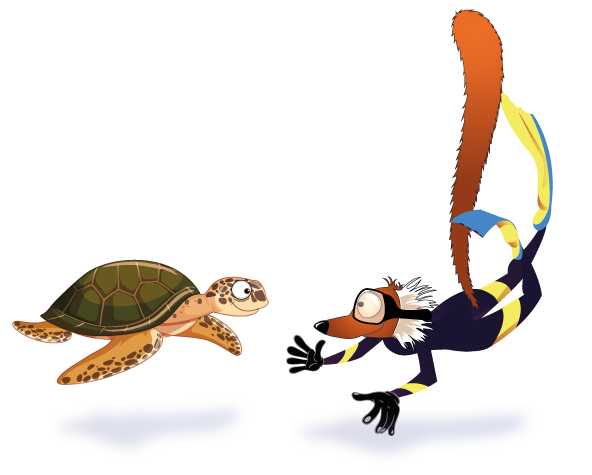
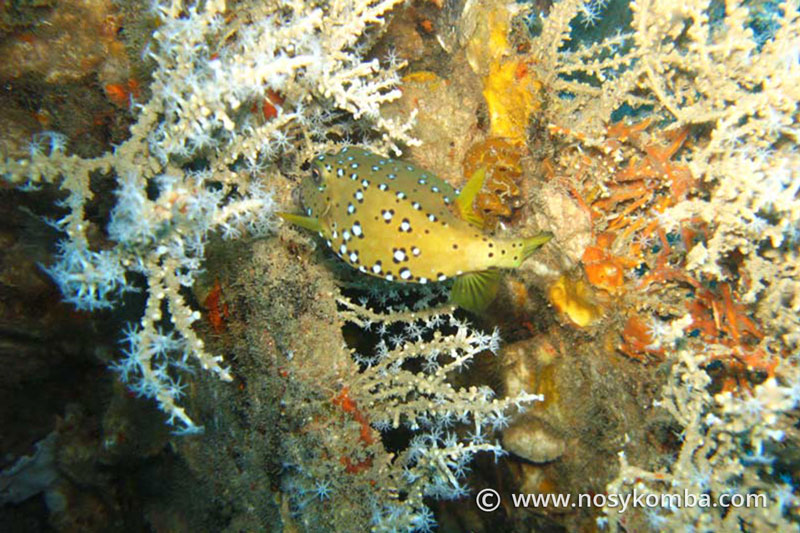
How do you prepare for a snorkelling session?
Essential equipment
To make the most of your snorkelling session, here’s what you’ll need:
- A quality mask and snorkel: Check that the fit is perfect to avoid water ingress.
- Comfortable fins: These make it easier to move around and reduce fatigue.
- A light wetsuit: (optional) or lycra to protect your skin from UV rays and possible rubbing against irritating organisms.
- Eco-responsible sun cream: If you can avoid it, all the better; if you can’t, opt for protection that respects the coral reefs.
